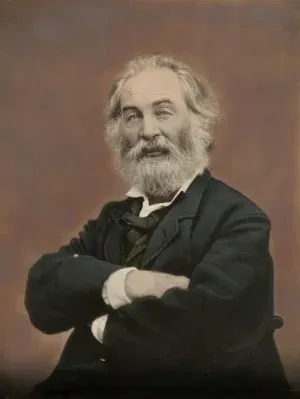Biography of Walt Whitman

| date | place | |
|---|---|---|
| born | May 31, 1819 | Huntington, New York |
| died | March 26, 1892 | Camden, New Jersey |
Walt Whitman, a pioneering American poet, essayist, and journalist, is celebrated as a key figure in American literature. Born into a humble family in the early 19th century, Whitman's ancestry was typical for the region. Despite limited formal education, he worked as a printer, teacher, and journalist before achieving literary prominence. In 1855, Whitman self-published his groundbreaking collection, "Leaves of Grass," incorporating both transcendentalism and realism. Though initially controversial for its overt sensuality, the collection gained acclaim, particularly from Ralph Waldo Emerson. Whitman continued refining his style through subsequent editions, addressing personal crises and the impact of the Civil War. During the war, Whitman's experiences in hospitals, tending to wounded soldiers, deeply influenced his poetry. His war-themed collection, "Drum-Taps," highlighted the harsh realities of conflict. Whitman's prose descriptions of the war, later published in "Specimen Days & Collect," showcased his moving simplicity. Despite facing personal and professional challenges, Whitman's work gained recognition in the late 1860s, with support from influential writers in England. His health declined in the 1870s, leading to a move to Camden, New Jersey. The threat of prosecution due to the perceived immorality of his work added to his struggles, but a surge in sales allowed him to secure a modest home in Camden. In 1888, a comprehensive collection of Whitman's works, "The Complete Poems and Prose," was published. The ninth edition of "Leaves of Grass" came out in 1892, the year of Whitman's death. Today, his legacy endures as one of America's literary giants, whose bold, free-verse poetry resonates across generations.
i huess yo cold say is potyrey